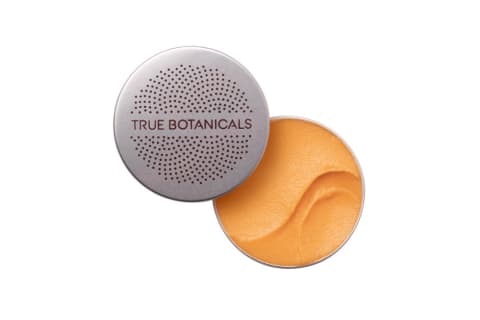
Our editors have independently chosen the products listed on this page. If you purchase something mentioned in this article, we may earn a small commission.
November 26, 2021 — 17:05 PM
Basil is a super-popular kitchen herb. Maybe you’ve planted a patch so you can pull its aromatic leaves into your kitchen, or brought home a bundle to brighten a meal. But most recipes call for only a small amount, likely leaving you with an abundance of basil, even after cooking—so, what can you do with the leftover leaves?
As the author of The Herbal Kitchen, I’ve tried incorporating basil into many household staples. And trust me: These five simple, creative recipes will help you use it up in a pinch. The best part? They can be great for several other aromatic culinary herbs, too, like rosemary, thyme, and sage. Just sub these seasonal favorites in for basil and pat yourself on the back for avoiding food waste and making something oh-so-special:
1. Add herbs to bathwater for skin-supportive benefits.
Basil‘s warming, aromatic constituents help calm the nervous system and clear the mind, making it a great addition to bath time.
To avoid clogging your drain (and staining your tub), you can either make basil tea and strain it before adding it to your bathwater or place your basil in DIY tea bags.
For a loose-leaf tea to add to the bath, boil 2 cups fresh or dried basil per 4 quarts water. Let the basil infuse in the water for one hour, and then strain, reheat the tea, and pour it into the tub.
For tea bags, place ½ to 1 cup fresh or dried basil into a sock or 7-by-7-inch piece of cotton fabric. Tie string or a rubber band around the opening of the fabric. Then, hook the sachet under the spout so the water will flow through as it fills your tub. After your bath is drawn, let the bag float in the water.
Compost the herbs when you’re done.
2. Make herb-infused cooking oil.
If you already cook with oil, why not make a simple gourmet treat and add the flavor of basil? Oil absorbs many of the nourishing qualities of herbs and spices, so you can drizzle herb-infused oils over your food to enhance its taste and healthfulness. (Trust me, after you eat a pizza or salad enhanced with basil oil, you’ll never want to use regular cooking oils again!)
To infuse olive oil with fresh basil, use ¾ cup fresh herb per 1 cup oil. Before infusing, let your fresh basil wilt on the countertop for 24 hours; this will reduce its water content, which will help prevent spoilage. Then, finely chop the basil, and combine it with oil in a sterilized glass jar. Steep for two weeks, and shake the jar several times during the steeping process.
After a few weeks, strain the oil to separate the leaves. Discard the leftover basil in your compost or garden. Refrigerate your herbal oil to lengthen its shelf life, and shake it well before using.
3. Make herb-infused vinegar.
probiotic+
Nix bloating & transform your gut health.*

Steeping herbs in vinegar is another way to preserve them for meals in the coming season.
If using fresh basil, chop it as finely as possible, and fill a glass jar ¾ full. If using dried basil, crush it in a mortar and pestle, and fill a glass jar ¼ full. Fill the jar with the vinegar of your choice, making sure it covers the basil by at least a couple of inches. If you’re using a metal lid, cover the opening of the jar with two sheets of waxed paper to prevent corrosion, and then attach the lid.
Store your vinegar in a cool, dark place for one month. Shake it occasionally and check every so often to see if some of it was soaked up by the basil. If the basil is emerging above the vinegar, add more vinegar. After one month, strain the vinegar to separate the liquids from the plant material.
Compost the strained ingredients, and store your vinegar in a clean container in a dark cabinet away from heat, light, and temperature variation. It should last for about one year.
Making salts is one of the simplest and most satisfying ways to use up leftover herbs. Plus, if herbs are accessible in shakers on the table, your family and friends will be more likely to use them!
The herbs you add to your shakers will need to be finely powdered. Basil powders well in a home blender or coffee grinder reserved for grinding herbs. Mix your powdered or ground basil in a bowl with an equal amount of salt (use the highest-quality salt you can find), and then pour the blend into your shaker or dispenser for sprinkling on food. Easy!
The shakers have open holes, so the herbs are constantly exposed to oxygen. This exposure will break down the herbs more rapidly, but they’ll usually still last up to six months. If you keep your herb salts in a jar with a tightfitting lid or in a shaker with a lid that closes over the holes, your salts can last for a year and sometimes longer.
Ghee is an excellent delivery mechanism for the supportive properties of herbs. Simply add ¼ cup powdered dried basil per 1 cup ghee, or ¾ cup minced fresh basil per 1 cup ghee.
If you’re working with cooled ghee, reheat it until melted, add the basil, and stir well. Once the ghee has solidified, stir it again until completely mixed. Don’t strain the basil out; you’ll eat it along with the ghee.
If you add dried basil to ghee, let it sit in the ghee for two weeks before eating. The ghee won’t have to be refrigerated and will be as stable as plain ghee as long as it’s stored in an airtight container and moisture isn’t reintroduced. If you add fresh basil to ghee, keep it in an airtight container in the refrigerator, and use within one week.
Reset Your Gut
Sign up for our FREE doctor-approved gut health guide featuring shopping lists, recipes, and tips
You are now subscribed
Be on the lookout for a welcome email in your inbox!
https://www.mindbodygreen.com/articles/creative-ways-to-use-up-leftover-basil-rosemary-tyme






